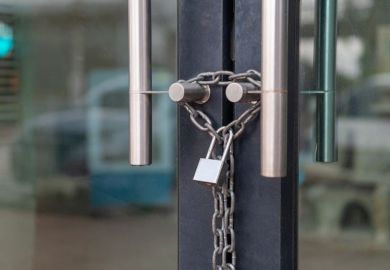The Office for Students comes into force on 1 April. This is also Easter Day and April Fool’s Day. You decide which is the most relevant.
To take the first of these, it would be a mistake to think that this is a resurrection of the Higher Education Funding Council for England – the insistence that the OfS is a different beast is not just public relations guff.
Hefce, as it said on the tin, was a funding agency, not a regulator. It was also a genuinely arm’s-length body, acting as a buffer between the government and universities in a way that preserved institutional autonomy. The OfS, which from the outset has provoked dark mutterings that it is a barely disguised Office for Government, is a different proposition. A regulator with a remit to be interventionist, its travails over the past six months have amplified the sense that it is far closer than its predecessor to being an arm of the state.
The most high-profile illustration was Toby Young’s bungled appointment to the OfS board by Jo Johnson, then universities minister.
Although Johnson’s direct involvement was confirmed only after an inquiry, it had been widely suspected at the time, and last week an email emerged highlighting how wary university leaders were of getting involved as a result.
Writing to vice-chancellors at the time of the row, Universities UK boss Alistair Jarvis warned that it would not be “in the best interests of the sector for UUK to publicly challenge this ministerial appointment”. So much for autonomy.
To be fair to the OfS, there has been no attempt to pretend that it is anything other than a regulator that will take on a sector that is seen as slippery and self-interested. The government is determined to instil value for money and student satisfaction as higher education’s ruling principles, and the OfS is charged with making it happen.
All this might seem entirely divorced from the ongoing dispute over the future of the Universities Superannuation Scheme, which has caused tens of thousands of higher education staff to go on strike over the past month. But perhaps it is part of a continuum.
The strike clearly is about pensions – a case of academics pushed too far on an issue that they took a hit on a few years ago, on the understanding that the axemen would not be back any time soon.
But, as others have observed, it is about more than just pensions. Academia has been under constant attack for the best part of a decade – and rarely for good reasons.
The USS and the OfS encapsulate that sense of an embattled profession being stripped of the very things that made it attractive in the first place.
Take the practical issue of pensions. No one could claim that academic careers are easy or structured in a way that is straightforward, but they have undeniably come with good terms and conditions. That was always one of the great benefits, and while it might be a stretch to suggest that people chose to work as academics for the pension, it is human nature to cling to such things.
Now consider a point of principle: academia has long been a profession in which individuals were in control of their working lives. They were not micromanaged, measured and messed around. They were trusted to pursue teaching and research as independent scholars, experts in their own fields with intrinsic motivation and academic freedom the twin foundations of excellence. In England, at least, the arrival of the OfS is the latest signal that this unfettered freedom is a thing of the past.
The point is that many of the unique attractions of academia have been ground down, and with it the trust that used to exist between rank-and-file academics and their leaders.
There is a sense that the bond of trust is also breaking down between universities and society (although not, interestingly, between academics and students, who are far more aligned on issues such as the pensions row and marketisation than die-hard reformers might care to admit).
Writing for us this week, George Letsas, professor of the philosophy of law at UCL, describes the USS row as a “strike to save higher education”. You may or may not agree, but it is not an April Fool – these are crucial moments in determining the future of higher education in the UK.
Register to continue
Why register?
- Registration is free and only takes a moment
- Once registered, you can read 3 articles a month
- Sign up for our newsletter
Subscribe
Or subscribe for unlimited access to:
- Unlimited access to news, views, insights & reviews
- Digital editions
- Digital access to THE’s university and college rankings analysis
Already registered or a current subscriber?








